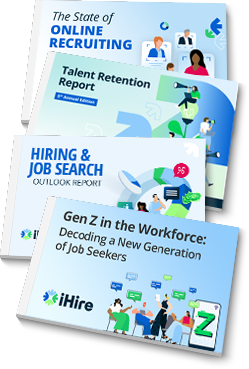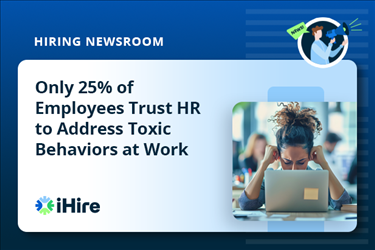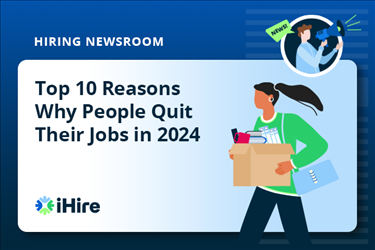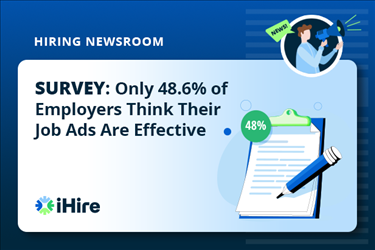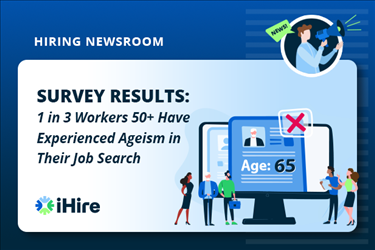- Employer Resources
- |
- Last Updated: June 24, 2025
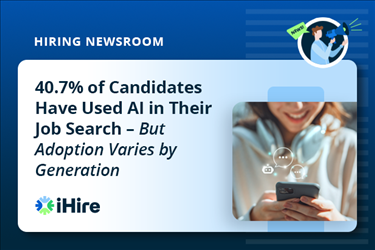
40.7% of Candidates Have Used AI in Their Job Search – But Adoption Varies by Generation
Back in early 2024, just 10.4% of job seekers surveyed for iHire’s Hiring & Job Search Outlook Report anticipated using AI to help further their job searches or grow their careers in the next year. Fast forward to today, and the proportion of candidates who are actually using AI is exponentially greater than expected.
Upon surveying 1,645 U.S. workers for our 2025 Inside the Multi-Generational Workforce Report, we discovered that 40.7% of job seekers have adopted AI tools (such as ChatGPT, Perplexity, Gemini, etc.) to make their job search more efficient.
Turns out, most people who said they wouldn’t use AI… already are. Let’s take a closer look at the data.
When we asked candidates to indicate how they’ve used AI in their job search (Figure 1), they cited writing their resume (19.0%) and customizing their resume (16.2%) as their top two use cases, followed by creating cover letters (14.3%) and researching potential employers (11.6%).
And, while 59.3% of candidates said they never used AI in their job search, 31.5% of that cohort plan to give it a try. That leaves just 27.8% of job seekers who are not using AI job search tools and are not planning to use them any time soon. What’s more, generational differences among candidates are influencing their readiness to embrace AI.
I have used artificial intelligence (AI) in my job search to: _____________ (Select all that apply.)
Figure 1
| Create my resume | 19.0% |
|---|---|
| Customize my resume for a specific job | 16.2% |
| Create cover letters | 14.3% |
| Research potential employers | 11.6% |
| Prepare for interviews/create practice interview questions | 11.5% |
| Craft emails/messages for communicating with potential employers | 9.7% |
| I have never used AI in my job search but plan to use it | 31.5% |
| I have never used AI in my job search and don’t plan to use it anytime soon | 27.8% |
How Different Generations Use AI in their Job Search
Our data suggests that AI adoption and interest in exploring this technology varies based on the job seeker’s age. When we broke down survey responses by generation, the youngest age groups in the workforce, millennials (54.5%) and Gen Zers (52.3%), showed higher adoption rates than Gen Xers (37.4%) and baby boomers (47.7%) (Figure 2):
Have you used AI in your job search?
Figure 2
| Yes | No | |
| Baby Boomers | 18.5% | 81.5% |
| Gen X | 37.4% | 62.6% |
| Millennials | 54.4% | 45.6% |
| Gen Z | 52.3% | 47.7% |
A deeper dive into iHire’s survey results shed additional light on generational AI trends (Figure 3):
- Millennials are AI power users, compared to other generations. This generation had the highest AI usage rates across all categories, including creating resumes (27.8%), customizing resumes (22.3%), writing cover letters (19.9%), and preparing for interviews (17.2%).
- The two older generations showed the least experience with AI, but expressed interest in giving it a go. 81.5% of baby boomers and 62.6% of Gen Xers said they had not used AI in their job search (compared to 45.6% of millennials and 47.7% of Gen Zers). However, 43.2% of baby boomers and 39.1% of Gen Xers who don’t use AI plan to use it soon.
- Despite perceptions that Gen Zers are the “tech-native” generation, a solid proportion (29.5%) of Gen Z job seekers have never used AI in their job search and don’t plan to use it any time soon. For comparison, 19.9% of millennials and 23.5% Gen Xers also said they had not used AI and didn’t plan to do so.
- Using AI to create resumes was the most popular use case for Gen X (19.6%), millennials (27.8%), and Gen Z (22.5%), while baby boomers’ top use case was creating cover letters (8.0%)
I have used AI in my job search to: _____________ (Select all that apply.)
Figure 3
| Baby Boomers | Gen X | Millennials | Gen Z | |
| I have never used AI in my job search and don’t plan to use it anytime soon | 38.3% | 23.5% | 19.9% | 29.5% |
| I have never used AI in my job search but plan to use it | 43.2% | 39.1% | 25.7% | 18.2% |
| Create my resume | 6.1% | 19.6% | 27.8% | 22.5% |
| Customize my resume for a specific job | 7.1% | 13.7% | 22.3% | 21.5% |
| Create cover letters | 8.0% | 12.7% | 19.9% | 16.5% |
| Prepare for interviews/create practice interview questions | 3.7% | 10.5% | 17.2% | 14.5% |
| Research potential employers | 4.6% | 12.2% | 16.7% | 12.6% |
| Craft emails/messages for communicating with potential employers | 3.9% | 8.1% | 14.8% | 11.9% |
AI Fears Still Linger Among Job Seekers
Although job seekers are increasingly adopting AI to help them land the right career opportunities, apprehension lingers about how the technology will impact the very thing they are searching for – their jobs.
According to iHire’s survey, 72.1% of candidates were at least “slightly” concerned that AI would make their job less significant or completely replace their role in the next five years (Figure 4). Of that 72.1%, 32.9% were “extremely” or “very” concerned. Meanwhile, 28.0% of respondents were not at all concerned.
How concerned are you that AI will replace your role or make it less significant in the next five years?
Figure 4
| Extremely concerned | 16.5% |
|---|---|
| Very concerned | 16.4% |
| Somewhat concerned | 25.8% |
| Slightly concerned | 13.4% |
| Not at all concerned | 28.0% |
Again, when survey results were broken down by age group, the following trends emerged (Figure 5):
- In addition to showing the highest adoption rates for AI in their job searches, millennials are the most worried about AI, as 39.3% of this group reported feeling “extremely” or “very” concerned about AI threatening their role.
- Gen Z followed millennials, with 36.6% saying they were “extremely” or “very” concerned. 31.2% were “somewhat” concerned – the most of any group.
- Gen X fell in the middle when it comes to AI apprehension, as 32.8% were “extremely” or “very” concerned; 27.6% were “not at all concerned,” which is more than millennials or Gen Zers but less than boomers.
- Baby boomers had the largest proportion of respondents (40.2%) who were “not at all” concerned about AI replacing them, while only 22.7% were “extremely” or “very” concerned. These sentiments are likely due to this group’s desire to retire in the coming years.
How concerned are you that AI will replace your role or make it less significant in the next five years?
Figure 5
| Baby Boomers | Gen X | Millennials | Gen Z | |
| Extremely concerned | 11.7% | 16.4% | 19.4% | 18.4% |
| Very concerned | 11.0% | 16.4% | 19.9% | 18.2% |
| Somewhat concerned | 20.7% | 24.7% | 26.4% | 31.2% |
| Slightly concerned | 16.3% | 14.9% | 12.3% | 10.2% |
| Not at all concerned | 40.2% | 27.6% | 22.0% | 22.0% |
What Does Job Seeker AI Adoption Mean for Employers?
As more job seekers utilize AI to create resumes, develop cover letters, craft emails, and more, employers will need to be wary of a few potential repercussions, including:
- Influx of applicants: AI job search tools make it easy for job seekers to quickly generate strong resumes, cover letters, responses to screening questions, and more, therefore, allowing them to apply for more jobs in a shorter amount of time. In their haste to send off more applications, they may not fully read job descriptions or assess their interest, leaving employers with too many applicants (including candidates that may not actually want the job).
- Resume embellishment or misrepresentation: AI tools for job seekers can unintentionally (or intentionally) help candidates exaggerate skills, titles, or experiences. As a result, employers may waste time interviewing candidates who are not actually qualified.
What’s Next for AI in the Job Search?
Looking ahead, job seekers will continue to find ways to use these evolving tools to accelerate their search and grow their careers. Therefore, employers must ensure they are hiring the right people in the wake of the AI boom. Implementing new or additional candidate screening methods such as skills assessments, behavioral interviews, work sample tests, and reference checks can help organizations bring about the most high-quality, genuine employees.
At the same time, the most forward-thinking employers should help assuage concerns around AI. This technology is not going anywhere, and companies that address employees’ apprehensions will be best positioned for the future. Empowering workers to use AI (according to company policy) and training them on how AI can make their jobs more efficient – not replace them – can help increase adoption and raise comfort levels. AI is in the toolbox now. The smartest recruiters will learn to use it better than their candidates do.
For the latest news about AI in the job search and hiring process, stay tuned to iHire’s Employer Resource Center.

Originally Published: June 24, 2025
RELATED RESOURCES
Hiring? You're in the Right Place.
- Reach unique talent: 51% of our candidates aren't using other job boards
- Connect your ATS and get 6x more applications with iHire's apply process
- Get matching candidate resumes sent straight to your inbox
We Value Your Privacy
